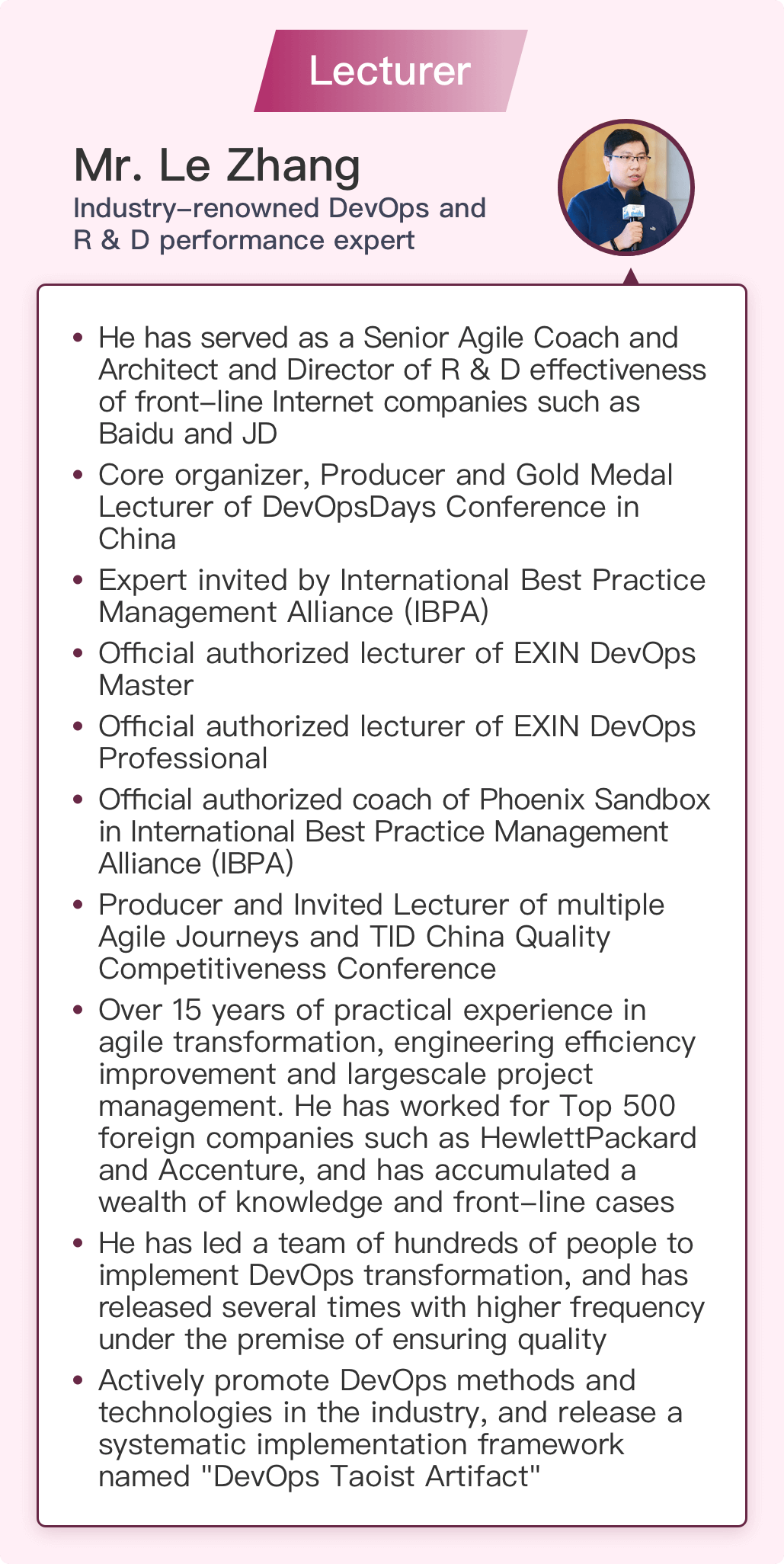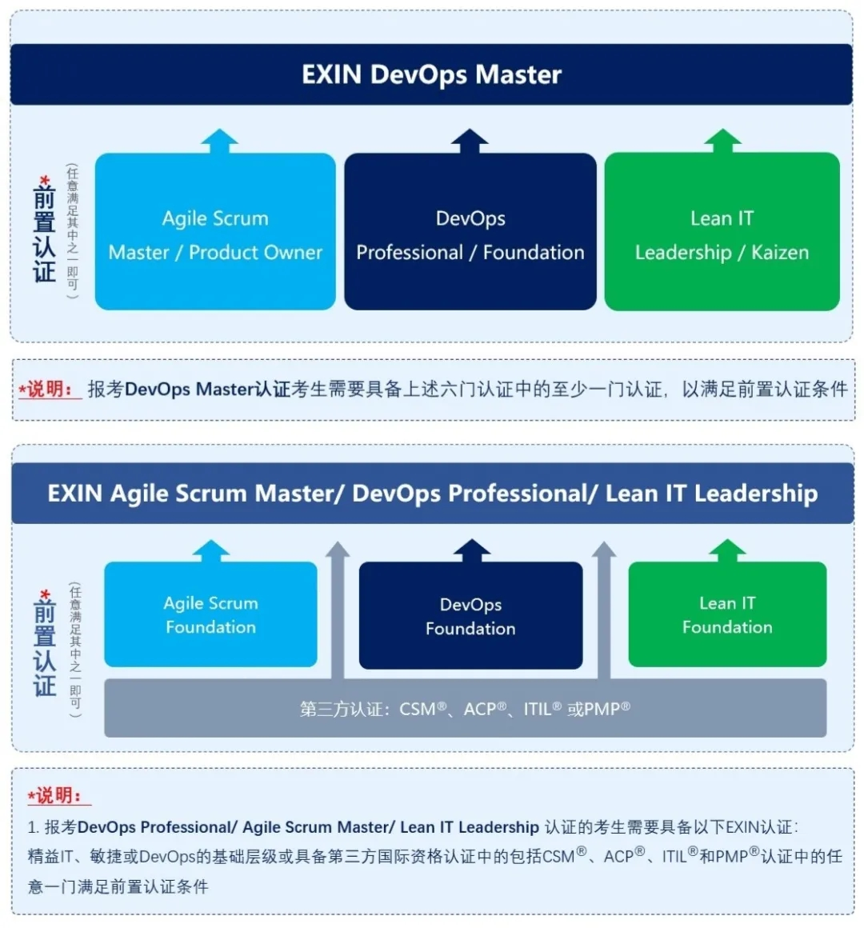
DevOps is such a popular method and technology purposed to deploy changes to the production environment or users in a sustainable manner quickly and securely, so that the software delivery process can be delivered continuously, achieving shorter delivery cycles, higher quality and lower cost. DevOps, on the one hand, promotes synergy between agile development, service management, and lean improvement. On the other hand, it contributes to the success of the entire organization by ensuring security and maintaining control in a continuous delivery pipeline. The survey shows that the acceptance of DevOps is increasing year by year, and many excellent companies have begun to accept DevOps methods and practices.
Training Period 25.09.2021-26.09.2021
Training Method Online(Participate through CIO Times APP synchronous classroom)
Training Fees
RMB6500/per (Including RMB2000/per certification fee);

Participants: It is suitable for anyone working in a DevOps environment or an organization considering a transition to a DevOps way of working.

1, The Overall Idea and Implementation Foundation of DevOps
1.1, Relationships Between DevOps and Other Management Movements such as Agile and Continuous Delivery
1.2, Common misunderstandings, how to dispel myths
1.3, DevOps trends and key success factors in the industry
1.4, A Three-step Working Method to DevOps implementation: flow, feedback, continuous learning and experimentation
1.5, DevOps participation role and recommended organizational structure
1.6, How to promote the integration of Dev and Ops teams
2, The 1st Step of Three-step Working Method: Flow
2.1, Technology and implementation of deployment pipeline
2.2, Code library and build management, automatic environment configuration management
2.3, Automated test classification model
2.4, Test-driven development
2.5, Implementation steps for continuous integration
2.6, Optimized branch management model
2.7, Impact and resolution of technical debt
2.8, Low-risk deployment and release model
2.9, Architecture design for low risk release
2.10, Case studies:Multiple national and international cases
3, The 2nd Step of Three-step Working Method:Feedback
3.1, Monitor and discover problems with telemetry
3.2, Forward release and rollback technology of deployment pipeline
3.3, Management guidelines for change release
3.4, Release readiness check and handover readiness check of Google
3.5, User experience feedback technology
3.6, Integrated A / B test to release and feature test, function switch technology
3.7, Hypothesis-driven development
3.8, Code review and collaboration, Pull Request process
3.9, Selection of code review techniques and scenarios
3.10, Case studies:Multiple national and international cases
4, The 3rd Step of Three-step Working Method:Continuous Learning and Experimentation
4.1, Amazon's Simian Army technology improves system recoverability
4.2, Contraction of exempt postmortem analysis
4.3, Enhance system robustness by injecting failures and Game Days into the production environment
4.4, Designing non-functional requirements for operations
4.5, O & M user stories: Reusable components
4.6, Create a single shared repository for organizational learning
4.7, Converting local normal to organizational improvements
4.8, Case studies:Multiple national and international cases
5, Information Security and Change Management
5.1, Embedding information security into routine
5.2, Integrate change management and security compliance control into the pipeline
5.3, Enhanced security with telemetry
5.4, Methods and techniques to ensure security in change
5.5, Methods and techniques to ensure compliance in change
5.6, Case studies:Multiple national and international cases

Notice
As a globally neutral digital management certification organization, EXIN has long been committed to creating the best international practical knowledge system for digital management. It provides a full range of multi-level certification systems for different job competence requirements in the DevOps, agile and lean certification exam knowledge system. The personnel competency certificates issued by EXIN are spread across the world's Top 500 companies.
In order to further meet the needs of global enterprises' digital capacity building and continue to increase the gold content of the certificate, the EXIN International Information Science Examination Association officially released today (February 27, 2020) "EXIN DevOps, agile and lean certification system pre-certification rules "(Hereinafter referred to as the pre-certification rules), requiring candidates to choose EXIN DevOps, agile and lean certifications objectively based on the current personal ability development path and meeting pre-certification qualifications. This is intended to help candidates to improve their knowledge and ability comprehensively and steadily, while maintaining healthy development of the certification market in the long-term. The rule comes into effect today.
For candidates who wants to obtain the certificate of EXIN DevOps Master, EXIN Agile Scrum Master, EXIN DevOps Professional, EXIN Lean IT Leadership, and EXIN Agile Scrum Master, you must obtain the corresponding pre-certification first from now on. For the specific pre-certification rules, please refer to the following:

Pre-certification path

List of pre-certification path descriptions
Candidates who have paid for DevOps, Agile and Lean Intermediate and Advanced exams are not required to meet the pre-certification rules described above. The certification body will be based on the list of candidates who have actually paid the examination fee provided by the authorized training institution before February 27, 2020.
Candidates who have taken the above DevOps, Agile and Lean Intermediate and Advanced exams but failed need to completed and passed the re-examination before December 31, 2020, and do not required to meet the pre-certification rules. It will be implemented in accordance with the pre-certification rules beyond the specified time
* The final interpretation of the preceding rules is owned by EXIN.
